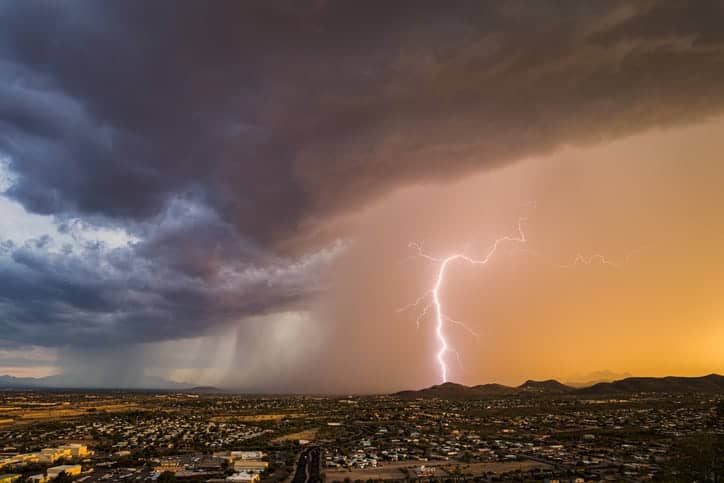
Summers in Arizona are known for long days playing sharks and minnows in the pool, only to pause for a popsicle break. Owning a pool is the most fun in the summer when you can enjoy it every day. What else are summers in Arizona known for? Monsoon season!
Monsoon season happens every year in late summer in Arizona. Heavy rainfall, large walls of dust called haboobs, thunder, and lightning move into the Valley and wreak havoc on the fun. These major summer storms can take a toll on your yard and pool. Pool owners need to have a plan for how to care for the pool before and after a storm.
Preparing for a Monsoon Storm
There are many things you can do to prepare for the onset of a major storm. When there is a storm in the forecast, doing these things before the storm hits can help alleviate the extent of the damage:
- Skim the surface for any debris
- Balance the water’s pH level
- Check the water level
- Clear out skimmer baskets
- Put away pool toys
Having a clean pool before a storm hits will ensure your pool can take on any debris that is thrown into it during the storm. You’ll also have an easier time cleaning the pool after the storm if you start with a clean slate.
During Peak Monsoon Time
Many pool owners choose to run the pump for a longer period of time during peak monsoon hours. This is a good idea because the water will likely be contaminated with dust and other storm debris. Before jumping in the water the next day, you’ll want to make sure the water has been filtered and sanitized.
Large items in your yard can be picked up by the wind and tossed around. Move patio items, like umbrellas and small furniture pieces, to a safe place. This means moving them away from the pool’s equipment and fence, both of which can be costly to repair and/or replace.
Cleaning Up After a Monsoon Storm
Putting your pool back together after a storm can be annoying, but it’s important. Check the pH level of the water again before you go swimming. Using a shock booster is not a bad idea to ensure the water is sanitized. Make sure your cleaning system is on a timer to run overnight and even into the early morning hours, which is usually the time when a storm has ended.
Brush up dust or dirt on the bottom of the pool to make sure it’s making its way into the filter. It’s also a good idea to do a quick check of the pump and filter to make sure there’s no major damage or dents on the equipment.
Monsoon Season Pool Safety
Most monsoon storms onset in the late afternoon to evening times. If you’re outside swimming and the sky starts to turn dark, this is usually a sign that a storm is rolling in. Make sure you’re aware of your surroundings so you can take action to protect your loved ones. Always exit the pool before a storm and follow these monsoon pool safety tips:
- Quickly remove all pool toys from the pool
- Secure pool toys from blowing back into the pool
- Don’t hang pool towels on the fence
- Lock the pool fence
- Exit the pool and go inside
You might be inclined to hurry up and go inside, but don’t forget about pool safety. Following the guidelines outlined above will ensure you have a fun pool season and a safe monsoon season.
Dhruv Gangwal is the Marketing Director at Shasta Pools, Arizona’s leading pool builder. With extensive experience in strategic marketing, consumer behavior, and the evolving trends of outdoor living, Dhruv is dedicated to helping homeowners make informed, confident decisions about their pool investments. He works closely with Shasta’s design and sales teams to craft educational resources that simplify the pool-buying process and highlight the latest innovations in backyard living. Dhruv’s articles provide practical advice that homeowners can trust.